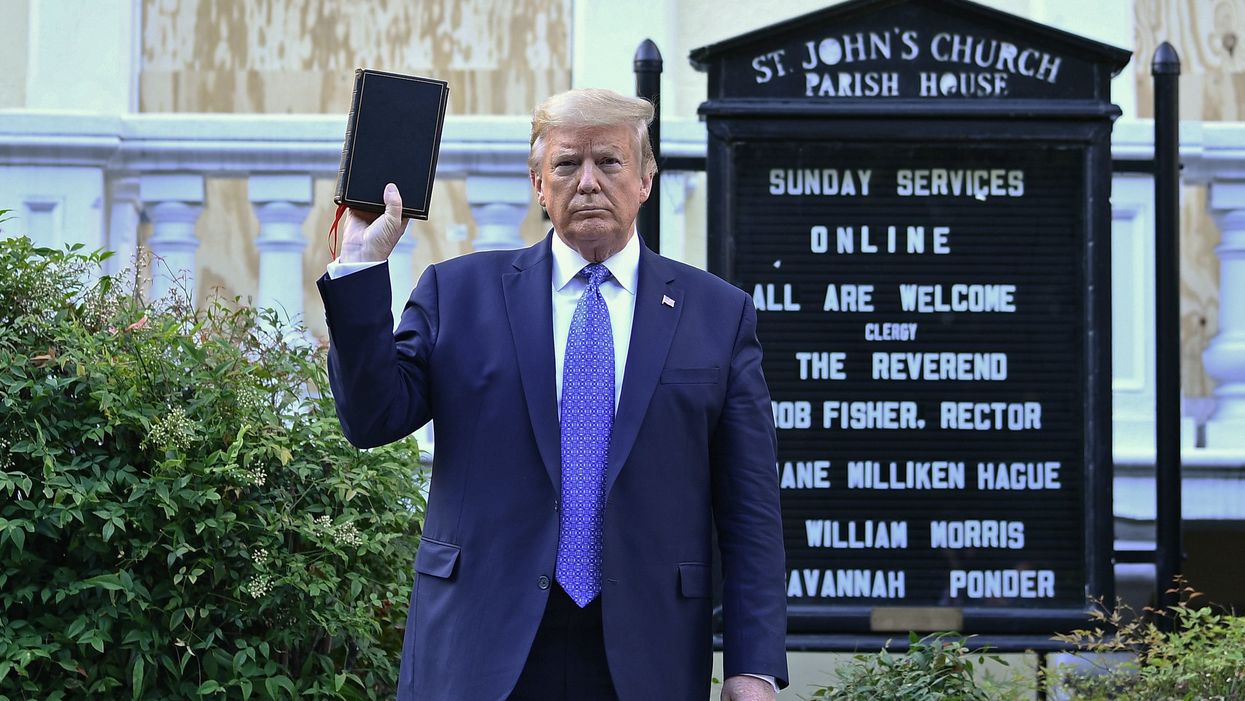The country has been consumed with a pandemic, an economic collapse and an uprising in the name of racial justice. But instead of rising to the challenge of addressing these colossal problems, President Trump has helped make freedom of religion a battlefront in the fight to stop the spread of Covid-19 and in the response to the killing of George Floyd.
He has played politics with religion in a way that damages America's democratic norms and practices.
In March, Trump called for the reopening of the national economy and places of worship by Easter, citing the symbolic significance of the Christian holiday.
In April, he met with conservative religious leaders and praised evangelical minister Franklin Graham for declaring the coronavirus "is a result of a fallen world, a world that has turned its back on God."
In May, the president highlighted the political dimension of his religious messaging when he said churches "are not being treated with respect by a lot of the Democrat governors." Playing to the fault lines of America's culture wars, he also criticized officials who have "deemed liquor stores and abortion clinics as essential, but have left out churches and other houses of worship."
And then on June 1, after tear gas and brute force moved peaceful protesters out of his way, the president walked from the White House to St. John's Church so he could be photographed awkwardly holding a Bible. That provoked a firestorm of criticism, but little of it focused on the ramifications for American democracy of a president's political use of religion during a national crisis.
Sign up for The Fulcrum newsletter
Wariness about that kind of mixing of religion and politics has been a critical component of America's democratic experiment right from the start.
It is enshrined in the First Amendment's prohibition of the "establishment of religion" and its guarantee of religious liberty, and in the clause of the Constitution specifying that "no religious test shall ever be required as a qualification to any office or public trust."
It also marked George Washington's presidency. His speeches contained many references to an "Almighty Being," or "the Benign Parent of the human race." Yet, believing it to be a danger to democracy, Washington opposed merging religion and public life.
Since then, American presidents have been more or less open about their religious beliefs — and their commitment to separating religion and politics.
Theodore Roosevelt offered one of the most explicit examples in 1908. "To discriminate against a thoroughly upright citizen because he belongs to some particular church," he told supporters who wanted to make a campaign issue of his opponent's religion, "is an outrage against the liberty of conscience which is one of the foundations of American life."
Confronting such bigotry a half century later, John F. Kennedy, campaigning to be the first Roman Catholic president, assured voters that "I do not speak for my church on public matters, and the church does not speak for me."
Amid such cautions, religious leaders for much of the 20th century played key roles in various movements seeking to build a more equal and inclusive society — just as they had a century earlier in the struggle against slavery.
Yet today the politicization of religious differences is much greater, complicating faith communities' efforts to avoid partisan entanglements. Polarization and tribalism now dominate American politics and have taken on a religious flavor.
A 2016 survey uncovered stark partisan differences among members of different religious groups. It found that the Democratic Party attracts voters from various spiritual backgrounds, while the Republican Party is an increasingly theological party, dominated by white evangelicals.
And not only do adherents of different religions align themselves with different parties these days; they treat one another as enemies who threaten their faith.
Many Democrats see what they call Christian "nationalism" as antithetical to "the vital interests of the country." In turn, some Christian leaders describe contemporary Democratic leaders as the "greatest threat to the free exercise of religion in American history" because they are "attacking the foundation of America's goodness."
The institutions of democracy are endangered by such intense religious entanglements and deep religious chasms, because they are ill-equipped to resolve conflicts over life's ultimate questions. Moreover, respect for procedure and the spirit of compromise that democracy requires cannot thrive when each side in a political debate sees the other as a danger to their deepest values.
This is the context in which the president's stoking of religious animosities has occurred. It helps explain why Trump's photo op two weeks ago was so significant.
The event's iconography intensified polarization and endangered democracy. And it suggested an alarming presidential point of view: People protesting police brutality and systemic racism, in the aftermath of Floyd's death under the knee of a Minneapolis officer, were like the Democratic governors Trump has reviled for refusing to open churches during the pandemic. They would defile religion if not contained — despite the fact that some of the people forcibly removed from the area were parishioners of the very church where the president posed.
By politicizing religion throughout this period of pandemic and protest, Trump is following the lead of authoritarian leaders in other nations by using "religion to reinforce his image as a strongman defending a particular brand of tradition against infidels."
James Madison alerted Americans to the threat that mixing religion and politics would pose for their fledgling democracy. "A zeal for different opinions concerning religion," he wrote in 1787, "divided mankind into parties, inflamed them with mutual animosity, and rendered them much more disposed to vex and oppress each other than to cooperate for their common good."
The warning rings true today: To use religion to divide Americans is to fail to "cooperate for their common good." If Trump genuinely wishes to build on religious precepts in a way that does not damage democracy, he would do well to heed the commandment to love thy neighbor as thyself.





















